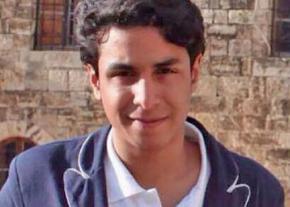They could be crucified for protesting
reports from New York City on the initiatives by defenders of human rights to confront another injustice in the making under the Saudi monarchy.
THE CRIMES of the regime in Saudi Arabia--and the U.S. government's military and political support that allows them to take place--should be a major scandal, but U.S. political leaders across the political spectrum have little to say about it.
The well over $1 billion in arms sales and other aid given annually to Saudi Arabia supports a devastating war in Yemen and the repressive state apparatus in Saudi Arabia itself, but the U.S. media remains as quiet as possible. Whether it is because the corporate media instinctively promotes U.S. imperial interests or because wealthy Saudis are major investors in media corporations--or both--it has been difficult to shame the U.S. government into altering its support for one of the world's worst human rights violators.
But an effort to free three courageous innocents--Ali Mohammad al-Nimr, Abdullah al-Zaher and Dawood al-Marhoon--could begin to change this, and save lives in the bargain.
In a more just world, al-Nimr, al-Zaher and al-Marhoon would be as celebrated as heroes, like Malala Yousafzai, the Pakistani woman who was recently the subject of a feature film. In 2012, amid the Arab Spring uprisings for democracy taking place across North Africa and the Middle East, the three youth, aged 15 to 17 at the time, were arrested merely for protesting. They were sentenced to be executed, even though all were juveniles at the time of their arrests.

According to the human rights organizations Reprieve and Amnesty International, the boys were tortured--through beatings, kicking and trampling--into confessing to far worse crimes, such as "concealing the offence of incitement, setting fire to a car, throwing Molotov cocktails and possession of firebombs," according to Reprieve.
Even so, Saudi officials went to the effort of charging al-Nimr with "explaining how to give first aid to protesters" and using a Blackberry to encourage others to join his protest--minor actions that show the extent to which the regime wants to criminalize the least form of dissent.
The young men now await execution--by beheading or crucifixion.
What the three actually did--protesting peacefully--is, of course, protected by international law. Yet this story of grotesque injustice--like so many others that take place continually in Saudi Arabia--have been almost entirely ignored by the major U.S. media.
DESPITE ALL of this, a few signs of hope have emerged.
In October 2015, the European Union voted to urge Saudi Arabia to pardon al-Nimr or commute his sentence. Last September, Jeremy Corbyn demanded--during his first conference speech as the leader of the Labour Party--that then-Prime Minister David Cameron "intervene now, personally, with the Saudi Arabian regime, to stop the beheading and crucifixion of Ali Mohammed al-Nimr."
In the U.S., Rep. Keith Ellison, co-chair of the Congressional Progressive Caucus, wrote to call on Secretary of State John Kerry "to personally intervene" to stop the execution of the three youth.
As an advocate for the three young men's families pointed out, the Saudi government has responded to pressure on occasion in the past. In 2007, the Saudi King Abdullah pardoned a teenage girl from Qatif, who had been serving a 10-year sentence for the "crime" of having been raped.
Protests have been held in Britain, France and the U.S. on behalf of the three. On August 19, a group of New Yorkers, including members of Code Pink and attorney Seema Iyer, demonstrated at Dag Hammerskjold Plaza, next to the United Nations headquarters. The site was chosen because, grotesquely, Saudi Arabia heads the UN Human Rights Council.
During the protest, we spoke to scores of passersby, few of whom knew about the victims of the Saudi regime. But many voiced a willingness to help.
Islamic and Asian Americans seemed most attuned to Saudi Arabia's abuses and most willing to show their support. It's another irony of the U.S.-Saudi relationship that the same U.S. media which criticizes so-called "moderate Muslims" for failing to denounce "Islamic extremism" has been silent about the Saudi youth--while Muslims in the West are willing to stand up for them.
The protests for the three have gathered more than 100,000 signatures on a change.org petition, and plans are in the works for "1001 Nights of Protest" to bring further attention to this case.
The international outcry may have delayed the executions of the three young men. But there cannot be any complacency--the murders could very well take place at any moment.
Sadly, U.S. elites will celebrate fighters for democracy such as Malala when that fits in with imperial interests--but similar protesters remain invisible if they are challenging an ally of the U.S. government. People of conscience must work to reverse this. If we do, the lives of three young men may be saved--and the U.S. government may no longer be able to ignore atrocities committed by its allies.


